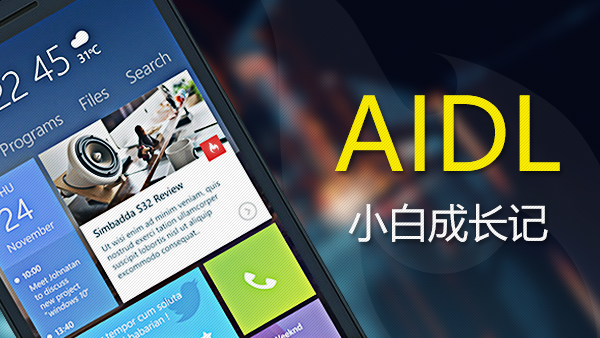这篇文章因为是台湾人写的,语言风格很别致。本文在原文的基础上做了一些微调(主要是繁体字的问题)。
今年(2014) 的 google i/o 发表令多数人为之一亮的 material design,而 google 也从「google i/o 2014」 开始,大家也陆陆续续地看到其更新的 android app 皆套用了这个设计介面。当然,这个设计介面著实让大家感到惊艳外,更让 android 开发者开始担心未来 app 的界面处理了。
不过,所幸有着之前 actionbar 的经验后,android 也很快地在 support library 里面提供了相对应的 api 给开发者使用,本篇就为各位介绍 – toolbar,这是用来取代过去 actionbar 的控件,而现在于 material design 中也对之有一个统一名称:app bar,在未来的 android app 中,就以 toolbar 这个元件来实作之。
1. 概述
Android 3.0 Android 推了 ActionBar 这个控件,而到了2013 年 Google 开始大力地推动所谓的 android style,想要逐渐改善过去 android 纷乱的界面设计,希望让终端使用者尽可能在 android 手机有个一致的操作体验。ActionBar 过去最多人使用的两大套件就是 ActionBarSherlock 以及官方提供在 support library v 7 里的 AppCompat。
既然会有本篇跟各位介绍的 Toolbar,也意味着官方在某些程度上认为 ActionBar 限制了 android app 的开发与设计的弹性,而在 material design 也对之做了名称的定义:App bar。接下来将为各位分成几个阶段进行说明,如何在 android app 中用 toolbar 这个控件来做出一个基本的 app bar 喽。
本篇所使用到的程序请到 Github 取得。
2. 基础套用
这个阶段从 toolbar_demo_checkpoint0 开始,分成下列三个部份:
风格 (style)
界面 (layout)
程序 (java)
2.1 风格(style)
风格要调整的地方有二
一在 res/values/styles.xml中
二在 /res/values-v21/styles.xml中
为了之后设定方便,我们先在 res/values/styles.xml 里增加一个名为 AppTheme.Base 的风格
1 2 3 4 | <style name="AppTheme.Base" parent="Theme.AppCompat"> <item name="windowActionBar">false</item> <item name="android:windowNoTitle">true</item> </style> |
因为此范例只使用 Toolbar,所以我们要将让原本的 ActionBar 隐藏起来,然后将原本 AppTheme 的 parent 属性 改为上面的AppTheme.Base,代码如下:
1 2 3 4 5 6 7 8 9 10 11 12 | <resources>
<!-- Base application theme. --> <style name="AppTheme" parent="AppTheme.Base"> </style>
<style name="AppTheme.Base" parent="Theme.AppCompat"> <item name="windowActionBar">false</item> <item name="android:windowNoTitle">true</item> </style>
</resources> |
再来调整Android 5.0的style: /res/values-v21/styles.xml,也将其 parent 属性改为 AppTheme.Base:
1 2 3 4 5 | <?xml version="1.0" encoding="utf-8"?> <resources> <style name="AppTheme" parent="AppTheme.Base"> </style> </resources> |
1 | <br> |
2.2 界面(Layout)
在 activity_main.xml 里面添加 Toolbar 控件:
1 2 3 4 5 6 7 | <android.support.v7.widget.Toolbar android:id="@+id/toolbar" android:layout_height="wrap_content" android:layout_width="match_parent" android:minHeight="?attr/actionBarSize">
</android.support.v7.widget.Toolbar> |
请记得用 support v7 里的 toolbar,不然然只有 API Level 21 也就是 Android 5.0 以上的版本才能使用。
这里需注意,要将 RelatvieLayout 里的四个方向的padding 属性去掉,并记得将原本的 Hello World 设为 layout_below="@+id/toolbar" ,否则会看到像下面这样的错误画面。
2.3 程序 (Java)
在 MainActivity.java 中加入 Toolbar 的声明:
1 2 | Toolbar toolbar = (Toolbar) findViewById(R.id.toolbar); setSupportActionBar(toolbar); |
声明后,再将之用 setSupportActionBar 设定,Toolbar即能取代原本的 actionbar 了,此阶段完成画面如下:
完整代码见:toolbar_demo_checkpoint1
3. 自定义颜色(Customization color)
这个阶段将从 toolbar_demo_checkpoint1 接着往下进行:
上图是将本阶段要完成的结果画面做了标示,结合下面的描述希望大家能明白。
1. colorPrimaryDark(状态栏底色):在风格 (styles) 或是主题 (themes) 里进行设定。
2. App bar 底色
这个设定分为二,若你的 android app 仍是使用 actionbar ,则直接在风格 (styles) 或是主题 (themes) 里进行设定 colorPrimary 参数即可;
可若是采用 toolbar 的话,则要在界面 (layout) 里面设定 toolbar 控件的 background 属性。
3. navigationBarColor(导航栏底色):
仅能在 API v21 也就是 Android 5 以后的版本中使用, 因此要将之设定在 res/values-v21/styles.xml 里面。
1. 主视窗底色:windowBackground
也因此在这个阶段,我们需要设定的地方有三,一是 style中(res/values/styles.xml)
1 2 3 4 5 6 7 8 9 10 | <style name="AppTheme.Base" parent="Theme.AppCompat"> <item name="windowActionBar">false</item> <item name="android:windowNoTitle">true</item> <!-- Actionbar color --> <item name="colorPrimary">@color/accent_material_dark</item> <!--Status bar color--> <item name="colorPrimaryDark">@color/accent_material_light</item> <!--Window color--> <item name="android:windowBackground">@color/dim_foreground_material_dark</item> </style> |
再来是 v21 的style中 (res/values-v21/styles.xml)
1 2 3 4 | <style name="AppTheme" parent="AppTheme.Base"> <!--Navigation bar color--> <item name="android:navigationBarColor">@color/accent_material_light</item> </style> |
最后,就是为了本篇的主角 – Toolbar 的 background 进行设定。
1 2 3 4 5 6 7 8 | <android.support.v7.widget.Toolbar android:id="@+id/toolbar" android:layout_height="wrap_content" android:layout_width="match_parent" android:background="?attr/colorPrimary" android:minHeight="?attr/actionBarSize">
</android.support.v7.widget.Toolbar> |
在本范例中,toolbar 是设定来在 activity_main.xml,对其设定 background 属性: android:background="?attr/colorPrimary" ,这样就可以使之延用 Actionbar 的颜色设定喽。
最后,再来看一下结果画面。
完整代码见: toolbar_demo_checkpoint2
转自:http://jcodecraeer.com/a/anzhuokaifa/androidkaifa/2014/1118/2006.html

 随时随地看视频
随时随地看视频




